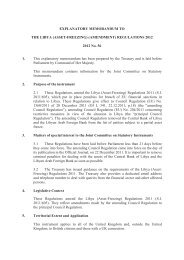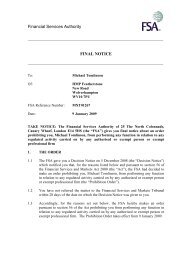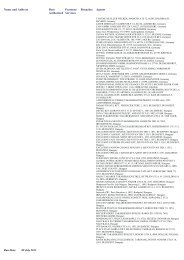FSA Annual Report 2006/07 - Better Regulation Ltd
FSA Annual Report 2006/07 - Better Regulation Ltd
FSA Annual Report 2006/07 - Better Regulation Ltd
Create successful ePaper yourself
Turn your PDF publications into a flip-book with our unique Google optimized e-Paper software.
Section six – Appendices<br />
Appendix 2<br />
109<br />
Retail distribution review<br />
Until the root causes of the problems in the retail distribution markets are<br />
resolved only limited progress can be made towards improved outcomes for<br />
consumers. The purpose of our retail distribution review is to deepen our<br />
understanding of the root causes of the problems in the retail investment<br />
market and then to help address them. We are working with industry-chaired<br />
groups and consumer representatives to find solutions that are attractive<br />
both to consumers and firms. There is an encouraging degree of consensus<br />
emerging on the possible future shape of retail distribution.<br />
Our Discussion Paper, to be published on 27 June, will set out the ideas that<br />
have been put to us and will seek feedback on how far these can address the<br />
problems that have been identified. We are giving a six-month period for<br />
discussion so that we can undertake further work to assess the costs and<br />
benefits of the options for change and the impact on different parts of the<br />
market. This will help us decide whether any regulatory change is needed to<br />
deliver the proposals and, if so, how to do this with appropriate periods of<br />
transition to limit any adverse effects on the proper working of the market.<br />
We are aware of the need to proceed cautiously and to consider carefully the<br />
impact of potential changes. However, it is clear to us that current<br />
arrangements are not sustainable, so we are determined to make progress.<br />
Thematic work<br />
Where similar issues arise in a number of different firms, we carry out<br />
thematic work – a co-ordinated programme of work involving a number of<br />
different firms to address an issue of potential or actual risk to our<br />
objectives. In planning our programme we consider the overall impact on the<br />
firms and markets we regulate. We have a range of regulatory tools that we<br />
can use to assess and monitor the risks; mystery shopping is just one of them.<br />
We also use, for example, desk-based reviews of firms’ product literature or<br />
visits to firms.<br />
There is no single prescribed sample size for a mystery shopping project; our<br />
aim is always to make the research ‘fit for purpose’. In being proportionate,<br />
we have to achieve the right balance between the cost to ourselves, the cost to<br />
the industry and the level of coverage required to generate useful conclusions.<br />
Qualitative samples are not (and are not meant to be) statistically<br />
representative of the population being researched. Instead, they are designed<br />
to reflect the target population by comprising a spread of the different types<br />
within the population. Quantitative research is used to measure what<br />
common behaviours or attitudes are, and so involves large samples that<br />
represent the target population. Because of the much larger samples required,<br />
quantitative research is more expensive and time consuming than qualitative<br />
research, and we would only use it if our research objectives dictated it.<br />
Our thematic plan for 20<strong>07</strong>/08 has fewer projects and is more clearly<br />
positioned so that it highlights the key issues we are focussing on. We have<br />
received positive feedback on this from industry and trade associations, who<br />
have told us that this gives them a clearer understanding of what our<br />
thematic priorities are and how we intend to address them. In the coming<br />
period, we intend to focus on a smaller number of larger themes. In response<br />
to requests from the Panel and other industry practitioners, we will say more<br />
about the risks we decide not to address in line with our risked-based<br />
approach. In all cases we will consider whether regulatory intervention is a<br />
‘must-do’ rather than a ‘nice-to-do’.









